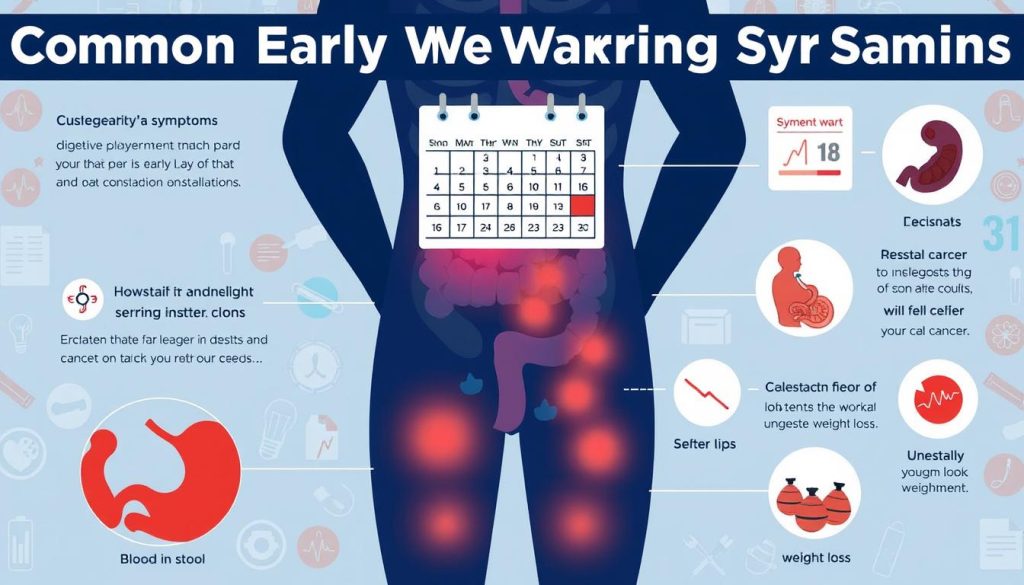Spotting colon cancer symptoms early can save lives. These signs are often missed, but catching them early makes a big difference. Let’s look at the key signs that might mean you need a doctor’s visit.
Changes in bowel habits and unexplained weight loss are early signs of colon cancer. It’s important to listen to your body and know these symptoms. Don’t ignore any persistent discomfort or changes – they could be a warning of a serious health issue.
In the next sections, we’ll explore specific symptoms of colon cancer. You’ll learn what to look out for and when to see a doctor. Remember, catching it early is the best way to fight colon cancer.
Understanding Colon Cancer: A Comprehensive Overview
Colon cancer is a serious health issue that affects thousands of Americans each year. It starts in the large intestine and can spread if not treated. It’s important to know about colon cancer, its risks, and how to prevent it for everyone’s health.
What is Colon Cancer?
Colon cancer happens when cells in the colon grow too much. These cells can form tumors and spread to other tissues. It often starts as small, noncancerous clumps called polyps. Over time, some polyps can turn into cancer.
Risk Factors and Prevention
Several factors can increase your risk of colon cancer. These include:
- Age (50 years and older)
- Family history of colon cancer
- Inflammatory bowel diseases
- Unhealthy diet high in red meats and processed foods
- Lack of physical activity
- Smoking and excessive alcohol use
Prevention strategies focus on lifestyle changes. Eating fruits, vegetables, and whole grains, exercising, and avoiding tobacco and alcohol can help. Regular screenings are also important in preventing colon cancer.
The Importance of Early Detection
Early detection is key in fighting colon cancer. When found early, it’s often treatable and curable. Regular screenings, like colonoscopies, can detect polyps before they become cancerous. If you notice any changes in your bowel habits or other worrying symptoms, see your doctor.
Common Colon Cancer Symptoms to Never Ignore
Spotting colon cancer symptoms early can save lives. Some signs might seem minor, but they’re important. Knowing these warning signs helps you act fast and get medical help.
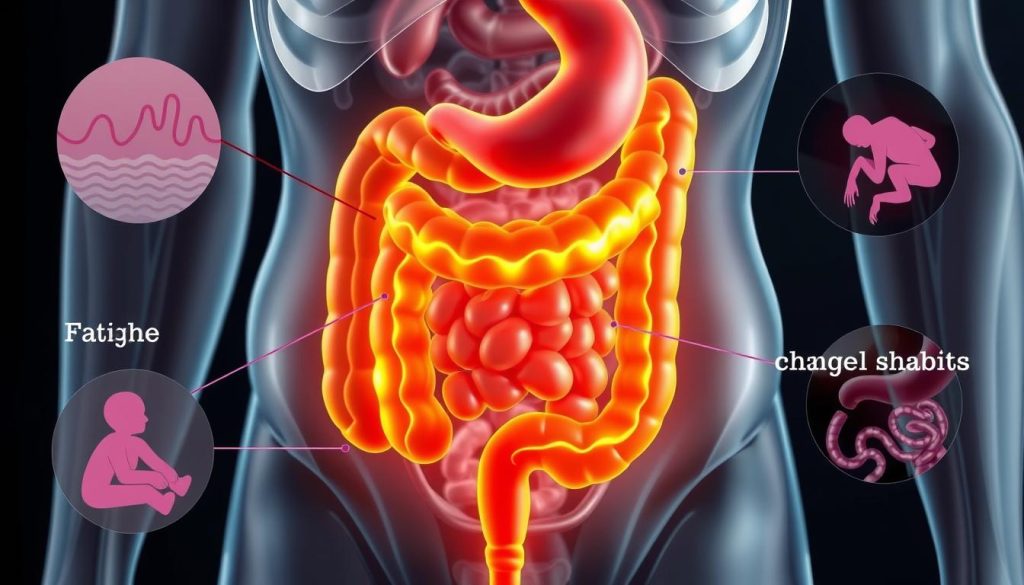
- Changes in bowel habits lasting more than a few days
- Blood in stool or rectal bleeding
- Persistent abdominal discomfort or cramping
- Unexplained weight loss
- Fatigue or weakness
- Feeling that the bowel doesn’t empty completely
These signs can differ from person to person. Some might see many symptoms, while others see none. If you notice any lasting changes for weeks, see your doctor.
Early detection is key to better treatment. By watching for symptoms and acting quickly, you help keep yourself healthy. Next, we’ll explore each symptom in detail. This will help you understand and spot warning signs better.
Persistent Changes in Bowel Habits
Noticing changes in bowel habits is key to knowing about colon health issues. It’s vital to watch for any shifts in your bathroom routine.
Diarrhea and Constipation Patterns
Diarrhea and constipation changes can be worrying. If these shifts last more than a few weeks, see a doctor.
Stool Consistency Changes
Watch your stool’s look. Odd shapes, colors, or textures might mean digestive problems. Thin stools or those with mucus need quick medical help.
Frequency Alterations
Changes in bathroom use are important too. More or less trips to the bathroom could mean a health issue. Listen to your body if something feels wrong.
| Symptom | Duration | Action |
|---|---|---|
| Diarrhea | More than 3 days | Seek medical advice |
| Constipation | More than 1 week | Consult a doctor |
| Alternating diarrhea and constipation | Persistent for weeks | Schedule a check-up |
Your body is wise. If you see lasting changes in your bowel habits, contact a healthcare expert. Early action can greatly improve treatment results.
Rectal Bleeding and Blood in Stool
Seeing blood in your stool is alarming. It’s a sign that should not be ignored. It could mean serious health problems, like colon cancer. Rectal bleeding can look different, from bright red streaks to darker, tarry stools.
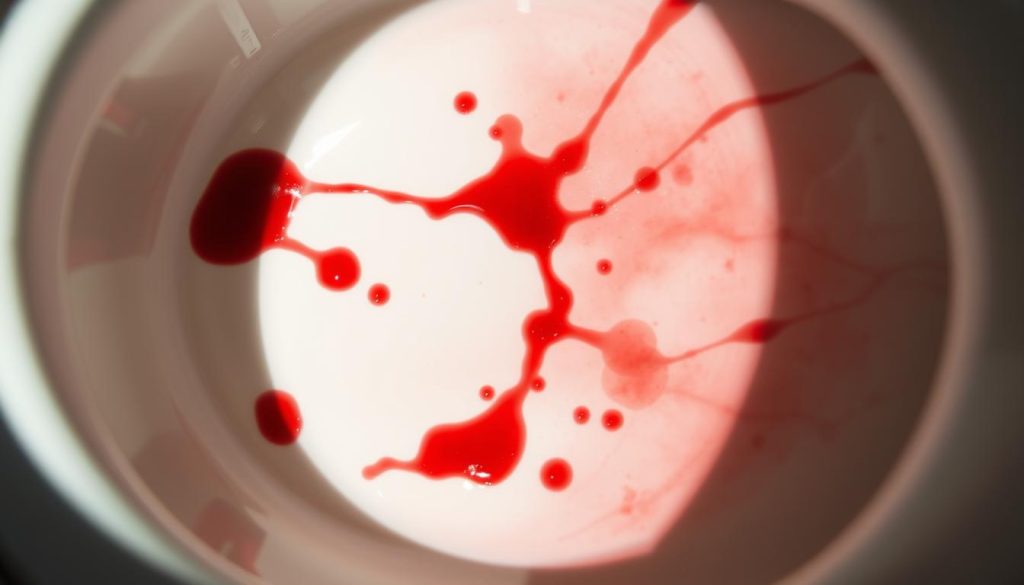
Not all blood in stool is easy to see. Sometimes, it’s only found through medical tests. That’s why regular screenings are key, even if you don’t see blood.
The color of the blood can tell you where it’s coming from:
- Bright red blood often indicates bleeding in the lower colon or rectum
- Dark red or maroon blood may come from higher in the colon
- Black, tarry stools could signal bleeding in the upper digestive tract
If you see persistent rectal bleeding or blood in your stool, see a doctor right away. It might not always mean cancer, but catching it early is key.
| Blood Appearance | Possible Source | Action Required |
|---|---|---|
| Bright red on toilet paper | Hemorrhoids or anal fissures | Monitor, see doctor if persistent |
| Dark red in stool | Bleeding in colon | Seek immediate medical attention |
| Black, tarry stool | Upper GI bleeding | Emergency medical care needed |
Any unexplained rectal bleeding or blood in stool needs a doctor’s check-up. Early treatment can greatly improve outcomes for colon cancer and other digestive issues.
Unexplained Abdominal Pain and Cramping
Abdominal pain and cramping can signal many health problems, including colon cancer. Knowing these signs can help you know when to see a doctor.
Location of Pain
Pain from colon cancer usually happens in the lower belly. It might be steady or come and go. It can feel like mild discomfort or sharp cramps. If you have pain that lasts or keeps coming back, it’s a sign to see a doctor.
Pain Intensity and Duration
The pain’s strength can change. Some feel sharp pains, while others have a dull ache. If the pain lasts more than a few days or keeps coming back, it’s time to consult a doctor.
Associated Symptoms
Abdominal pain and cramping usually come with other symptoms. Look out for these:
- Bloating or gas
- Changes in bowel habits
- Nausea or vomiting
- Fatigue
| Symptom | Description | Action |
|---|---|---|
| Mild pain | Occasional discomfort | Monitor closely |
| Severe cramping | Intense, persistent pain | Seek medical help |
| Pain with other symptoms | Abdominal pain plus additional signs | Consult doctor promptly |
Early detection is critical. If you have unexplained belly pain or cramps, and other symptoms too, don’t wait to get medical advice.
Fatigue and Weakness: Hidden Warning Signs
Feeling tired and weak might seem like everyday troubles, but they could be signs of something more serious. Fatigue and weakness are often overlooked symptoms that might point to colon cancer. These subtle changes in your body deserve attention.
Fatigue in colon cancer isn’t just being sleepy. It’s a deep, unshakable tiredness that rest doesn’t fix. This happens because cancer cells use up your body’s energy. Weakness often comes along with fatigue, making simple tasks feel like big challenges.
Why do these symptoms occur? As colon cancer grows, it can lead to bleeding inside the body. This blood loss can cause anemia, which makes you feel tired and weak. Cancer also releases substances that can make you feel drained.
Don’t brush off lasting fatigue or weakness. If you notice unexplained changes in your energy, it’s wise to talk to your doctor. While these symptoms don’t always mean cancer, catching colon cancer early can make a big difference in treatment outcomes.
| Normal Tiredness | Fatigue from Colon Cancer |
|---|---|
| Improves with rest | Persists despite rest |
| Linked to daily activities | Unexplained and constant |
| Temporary | Lasts for weeks or months |
| Doesn’t affect daily life much | Interferes with normal activities |
Remember, your body often gives subtle hints when something’s wrong. Listening to these signals and acting on them can be critical for your health. If fatigue and weakness are new, lasting issues for you, it’s time to check in with your healthcare provider.
Unexplained Weight Loss and Appetite Changes
Sudden weight loss and changes in appetite can be scary. They might mean you have a health problem, like colon cancer. Let’s look at how these signs show up and why they matter.
Rapid Weight Loss Patterns
Weight loss without trying is a warning sign. If you lose 10 pounds or more in a few months, it’s a clue. Your body might be trying to tell you something’s wrong.
Changes in Eating Habits
Colon cancer can mess with your appetite. You might feel full quickly or lose interest in food. Some people eat less, while others crave strange foods. These changes can lead to weight loss.
Watch your eating habits. If you eat less or differently without a reason, talk to your doctor. Early detection is key to treating colon cancer well.
- Track your weight regularly
- Note any changes in food preferences
- Pay attention to feelings of fullness or lack of hunger
Weight loss and appetite changes don’t always mean cancer. But, they’re symptoms to talk about with a doctor. Your body might be trying to tell you something. So, listen and get medical advice if you’re worried.
Understanding Anemia’s Connection to Colon Cancer
Anemia often goes hand in hand with colon cancer symptoms. This blood condition occurs when your body lacks enough healthy red blood cells. This makes it hard for your body to carry oxygen to tissues.
In colon cancer, bleeding from tumors can lead to iron deficiency anemia. This is a common early sign of the disease.
People with colon cancer may feel tired, weak, and short of breath due to anemia. These symptoms can start off mild but get worse over time. Pale skin, chest pain, and dizziness are also signs of anemia linked to colon cancer.
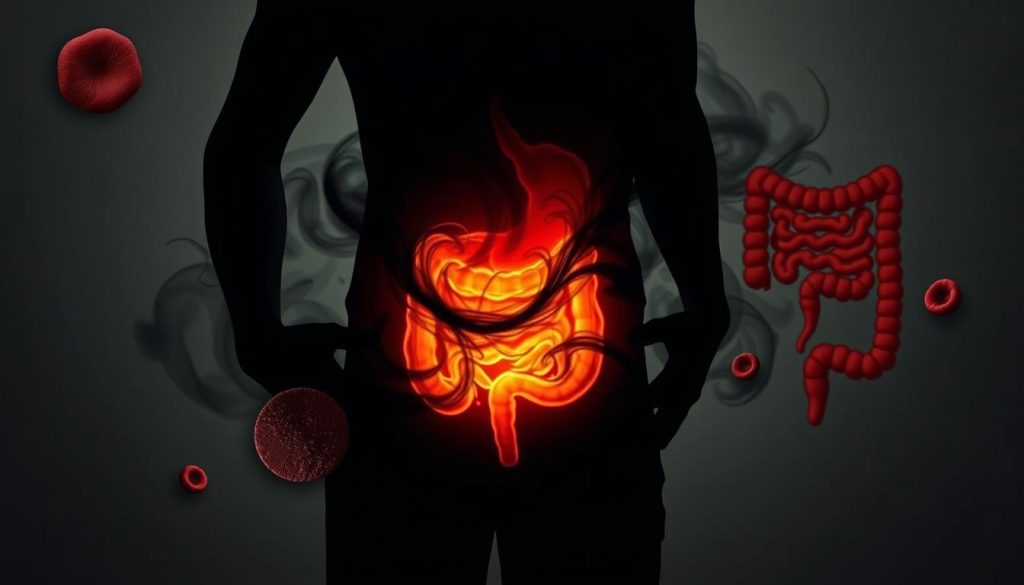
Regular blood tests can spot anemia before symptoms show up. If you’re diagnosed with unexplained anemia, your doctor might look for colon cancer. Early screening is key for better treatment results.
| Anemia Symptoms | Colon Cancer Symptoms |
|---|---|
| Fatigue | Rectal bleeding |
| Pale skin | Change in bowel habits |
| Shortness of breath | Abdominal pain |
| Dizziness | Unexplained weight loss |
If you have persistent anemia or any colon cancer symptoms, see your healthcare provider right away. Early diagnosis and treatment can greatly improve your chances and quality of life.
Digestive Issues and Persistent Bloating
Digestive problems can be a big worry. But if they keep happening, it’s time to take action. Colon cancer might show up as ongoing digestive issues and bloating. Knowing these signs can help you know when to see a doctor.
Gas and Bloating Patterns
It’s normal to feel bloated sometimes. But if it happens a lot and doesn’t get better, it could be a sign of something serious. This is true if you also have stomach pain or changes in how you go to the bathroom.
Digestive Discomfort
Digestive trouble linked to colon cancer feels different from usual indigestion. You might feel:
- Cramping that doesn’t go away
- Being full even after eating a little
- Nausea or vomiting without a reason
If these problems last more than a few weeks, see your doctor. These symptoms don’t always mean cancer. But catching it early is important for treating any health issues.
When to Seek Medical Attention
Spotting colon cancer symptoms early can save lives. If you notice lasting changes in your body, see a doctor right away. Don’t ignore these warning signs:
- Unexplained weight loss
- Blood in stool or rectal bleeding
- Ongoing abdominal pain or cramping
- Changes in bowel habits lasting more than a few weeks
- Constant fatigue or weakness
Trust your instincts. If something feels off, seek medical attention. Early detection greatly improves treatment outcomes for colon cancer.
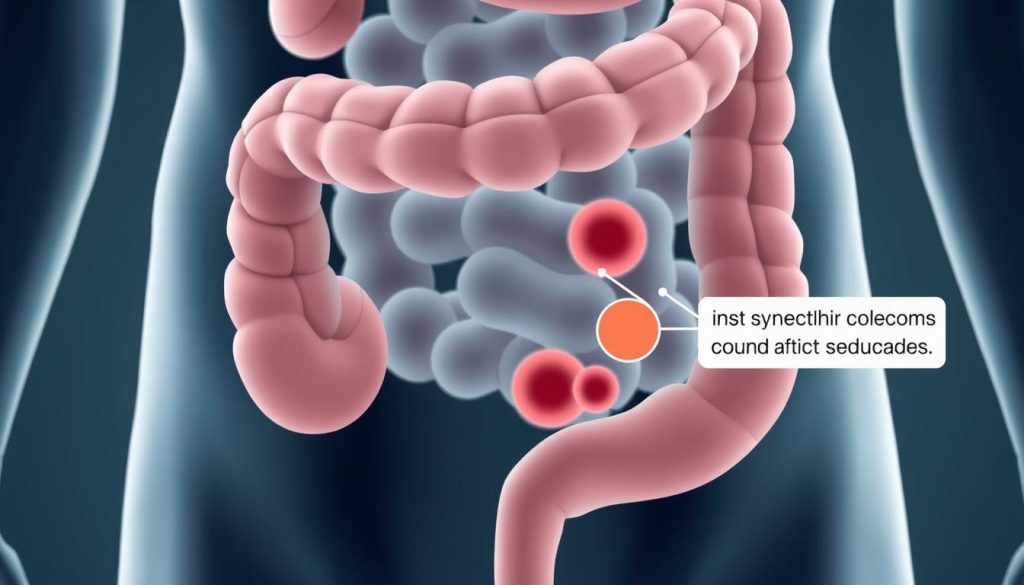
Remember, these symptoms don’t always mean cancer, but they warrant investigation. Your doctor can perform tests to rule out serious conditions or start treatment if needed.
| Symptom | When to Seek Help |
|---|---|
| Rectal bleeding | Immediately, regardless of amount |
| Change in bowel habits | If persists for more than 2 weeks |
| Unexplained weight loss | If you lose 10+ pounds without trying |
| Abdominal pain | If severe or lasts more than a few days |
Don’t let fear or embarrassment prevent you from seeking help. Early diagnosis and treatment of colon cancer symptoms can make a significant difference in your health outcome.
Diagnostic Tests and Screening Methods
Early detection is key in fighting colon cancer. Several diagnostic tests and screening methods help doctors identify issues. Let’s explore the main approaches used to detect this disease.
Colonoscopy
A colonoscopy is the top choice for colon cancer screening. A doctor uses a long, flexible tube with a camera to check the entire colon. This method allows for the removal of suspicious polyps, which can prevent cancer.
Blood Tests
Blood tests are also used in colon cancer screening. They can spot anemia, which might mean bleeding in the digestive tract. Some tests look for specific markers that could show cancer cells.
Imaging Studies
Imaging techniques help in diagnosing colon cancer. CT scans give detailed images of the abdomen and pelvis. Virtual colonoscopy uses CT to create 3D images of the colon. These methods are less invasive than traditional colonoscopy.
Regular screenings are key for early detection. Talk to your doctor about the right tests for you. Remember, early detection can save lives.
Risk Factors That Increase Your Chances
Knowing the risk factors for colon cancer is key to catching it early and preventing it. Some risks we can’t control, but others we can manage by changing our lifestyle.
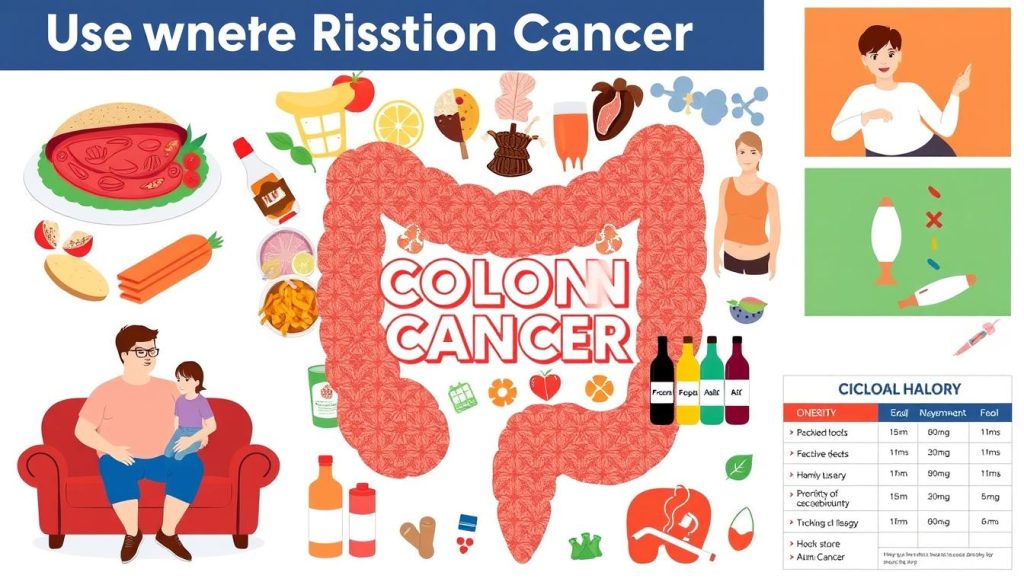
Age is a big factor in colon cancer risk. People over 50 are more likely to get it. If your family has a history of colon cancer, your risk goes up too.
Our lifestyle choices also play a part. Eating a lot of red and processed meats can increase your risk. Not being active and being overweight also raise your chances of getting colon cancer.
Smoking and drinking too much alcohol can also lead to colon cancer. Quitting smoking and drinking less can help lower your risk.
| Risk Factor | Impact on Colon Cancer Risk |
|---|---|
| Age (over 50) | High |
| Family History | Moderate to High |
| Diet High in Red/Processed Meats | Moderate |
| Lack of Physical Activity | Moderate |
| Obesity | Moderate |
| Smoking | Moderate |
| Heavy Alcohol Consumption | Moderate |
By understanding these risk factors, you can take steps to lower your colon cancer risk. Regular screenings are vital, even more so if you have several risk factors.
Prevention Strategies and Lifestyle Changes
Reducing your risk of colon cancer is key. Smart lifestyle choices can lower your risk. Let’s look at some prevention strategies that can improve your health.
Dietary Modifications
Your diet is critical in preventing colon cancer. Eating more fruits, vegetables, and whole grains helps. Reduce red and processed meats, which increase cancer risk. Choose lean proteins like fish and poultry instead. Eating well is a powerful way to lower your risk.
Exercise Requirements
Regular exercise is also vital. Aim for 150 minutes of moderate or 75 minutes of vigorous exercise weekly. Activities like brisk walking, swimming, or cycling are good. Exercise keeps you healthy and reduces inflammation, both important for preventing colon cancer.
Regular Screening Schedule
While lifestyle changes are important, screenings are the best way to catch colon cancer early. Most people should start screenings at 45. Your doctor will decide the best schedule for you. Don’t delay these tests – they’re essential for prevention.
FAQ
Q: What are the most common early signs of colon cancer?
A: Early signs of colon cancer include changes in bowel habits and rectal bleeding. You might also feel unexplained abdominal pain or cramping. Fatigue, unexplained weight loss, and anemia are other symptoms.
Remember, these signs can also point to other health issues. But it’s always best to check them out with a doctor.
Q: How often should I get screened for colon cancer?
A: The American Cancer Society suggests starting screenings at 45 for most people. You might need a colonoscopy every 10 years or a stool test every 1-3 years. If you’re at higher risk, you might need to start sooner or get tested more often.
Always talk to your doctor about the right screening schedule for you.
Q: Can colon cancer be prevented?
A: While you can’t prevent all cases of colon cancer, a healthy lifestyle can help. Eat a diet full of fruits, veggies, and whole grains. Limit red and processed meats and exercise often.
Keep a healthy weight, drink less alcohol, and don’t smoke. Regular screenings are also key for early detection.
Q: Is rectal bleeding always a sign of colon cancer?
A: No, rectal bleeding isn’t always a sign of colon cancer. It can also be due to less serious issues like hemorrhoids or anal fissures. But, any unexplained bleeding should be checked by a doctor.
Q: Are younger adults at risk for colon cancer?
A: Yes, colon cancer is becoming more common in younger adults. That’s why screening guidelines now start at 45 for those at average risk. Younger adults should watch for symptoms and talk to their doctor about any concerns.
Q: How is colon cancer diagnosed?
A: Doctors use several methods to diagnose colon cancer. These include physical exams, blood tests, and stool tests. A colonoscopy is also key, as it lets doctors see the colon and rectum.
They can remove polyps or take biopsies during the colonoscopy. CT scans might also be used to check if cancer has spread.
Q: What’s the relationship between anemia and colon cancer?
A: Anemia, often iron-deficiency anemia, can be a sign of colon cancer. Tumors can bleed slowly, leading to blood and iron loss. This can cause fatigue, weakness, and shortness of breath.
If you have unexplained anemia, it’s important to talk to your doctor. It could be a sign of colon cancer or another issue.












